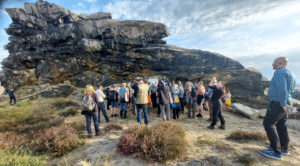Project 2315 sa: Shedding light on current developments in Paleo Ecological Genomics (SedaDNA)
The first sedimentary DNA (sedDNA) Meeting took place from June 6th to 9th, 2023, at the Alfred-Wegener-Institute (AWI) Helmholtz Centre for Polar and Marine Research in Potsdam, Germany.
Abstract
Sedimentary ancient DNA (sedaDNA) is revolutionising the way scientists reconstruct past biodiversity and ecological dynamics. As a powerful proxy, sedaDNA enables researchers to examine historical biological communities across decadal to millennial timescales. This approach is transforming paleoecological research by offering unprecedented insight into eco-functional changes in terrestrial, freshwater, and marine environments.
The SedaDNA Meeting Potsdam brought together a vibrant, international community of researchers who are pushing the boundaries of sedaDNA science. This multidisciplinary event spanned three key components:
-
Symposium: A diverse scientific program featuring oral and poster contributions from leading experts across a wide range of sedaDNA research fields. Presentations covered cutting-edge case studies, methodological innovations, and emerging applications in paleoecology.
-
Hands-on Workshop: Aimed particularly at Early Career Researchers (ECRs), this workshop provided practical training in sedaDNA methodologies, bioinformatic pipelines, and statistical analysis. Participants gained essential skills and insights to enhance their own research.
-
Collaborative Writing Workshop: Organized by the PAGES PaleoEcoGen working group, this session fostered collaborative efforts to draft a synthetic publication. The focus was on analyzing sedaDNA time series to identify critical ecological transitions—contributions that will inform biodiversity conservation and future scenario modelling.
The meeting served as a nexus for knowledge exchange and interdisciplinary collaboration, with invited speakers representing a broad spectrum of expertise. By creating a dynamic platform for discussion and partnership, the event aimed to propel the field toward more quantitative and integrative paleoecological research. Special attention was given to nurturing the next generation of scientists through mentorship, skill development, and networking opportunities.

Project leaders:
- Kathleen Stoof-Leichsenring, Alfred-Wegener-Institute, Helmholtz Centre for Polar and Marine Research, Germany
- Ulrike Herzschuh, AWI Potsdam, Germany
Find out more
Related items
Latest developments
View moreLatest developments Podcast INQUA India 2027
Podcast INQUA India 2027Quaternary is the age when modern recognisable humans started inhabiting this planet. All over the world scientists are engaged in studying various aspects of human evolution. Once every 4 years scientists from all across the…
 PALCOM-supported sessions
PALCOM-supported sessionsINQUA PALCOM interactive bulletin of scientific sessions for the INQUA Congress 2027
 New QP Issue Out!
New QP Issue Out!QP Issue 39 December 2025 is now available online!
 INQUA 2025 Sir Nicholas Shackleton Medal
INQUA 2025 Sir Nicholas Shackleton MedalThe INQUA 2025 Sir Nicholas Shackleton Medal recipient is Prof. Dr. Nicole Khan from the University of Hong Kong (Hong Kong)
 7th International Palaeontological Congress – IPC7
7th International Palaeontological Congress – IPC7The 7th International Palaeontological Congress (IPC7) will be held between 30 November – 3 December 2026 in Cape Town, South Africa
 4th International Conference Polar Climate and Environmental Change in the Last Millennium
4th International Conference Polar Climate and Environmental Change in the Last MillenniumThe 4th International Conference Polar Climate and Environmental Change in the Last Millennium will be held in Toruń on August 28–30, 2026


